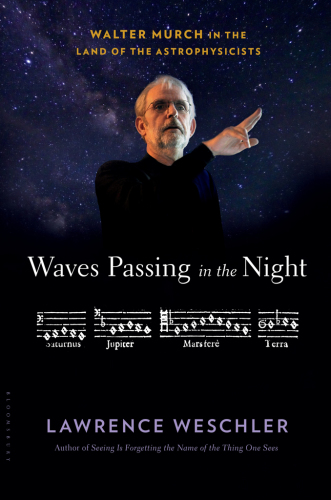
Waves Passing in the Night
Walter Murch in the Land of the Astrophysicists
کتاب های مرتبط
- اطلاعات
- نقد و بررسی
- دیدگاه کاربران
نقد و بررسی

Starred review from October 17, 2016
An amateur scientist investigates oddly musical mysteries in the motion of the planets in this scintillating true-astronomy saga. Journalist Weschler (Mr. Wilson’s Cabinet of Wonders) profiles Walter Murch, a celebrated Hollywood film and sound editor (for The Godfather and other movies) and renaissance man bent on rehabilitating a long-discredited 18th-century theory that the orbital distances of planets from the sun have fixed ratios. (The ratios also crop up among moons, asteroid and comet belts, and planets in other solar systems.) It’s a beguiling theory, well explained in Weschler’s brisk, lucid exposition, with possibly cosmic implications about gravity waves or dark matter and a piquant relationship to musical intervals, which have similar ratios between individual sound frequencies. The author sounds out astrophysicists on Murch’s theory and gets almost uniformly negative critiques—some orbits don’t fit the ratios; it could all be chance; gravity waves are too weak to corral planets into specific orbits, and there’s no other plausible mechanism to explain the ratios—to which Murch responds, often cogently. Weschler remains sympathetic to both sides in this debate between an inspired novice and skeptical pros, expanding it into a fascinating lesson on the nature of scientific understanding and the ways people seek it. Photos.

November 15, 2016
An odd but appealing portrait of an Academy Award-winning sound editor fascinated with a simple 18th-century equation that predicts the distance of planets and satellites from the central body.Called Bode's law, its predictions are accurate--most of the time; sometimes it fails. As illustrated in Mr. Wilson's Cabinet of Wonder (1995), critic and journalist Weschler (Uncanny Valley: Adventures in the Narrative, 2011, etc.) has a taste for talented eccentrics, and Walter Murch (b. 1943), who has worked on Apocalypse Now, the Godfather films, The English Patient, and other acclaimed films, certainly qualifies. A brilliant polymath and perhaps the world's most respected film and sound editor, Murch has been nominated for nine Academy Awards and won three. Although his impressive Wikipedia entry fails to mention it, Murch has devoted 20 years to a private crusade promoting Bode's law in lectures, writing, and correspondence. Encountering him five years ago, Weschler was converted, and he devotes this slim volume to explaining Murch's efforts and interviewing scientists who are almost universally dismissive. "Numerology," one commented. Readers will have no trouble understanding the Bode equation, the mathematics of which is simple high school algebra. The author is convincing in his argument that the scientific establishment has treated Murch unfairly. There's no denying that some objections are petty--e.g., Murch's lack of academic training in the subject. There's also no denying that working scientists have plenty of experience with crackpots who obsessively promote one big idea. In fact, gravity and processes of planetary formation lead to some surprising regularities. Working astronomers don't ignore Bode's law but consider it an ingenious ad hoc invention that doesn't adequately explain anything. An extended New Yorker-style profile of a public figure who is charismatic and interesting enough to deserve a fuller biography.
COPYRIGHT(2016) Kirkus Reviews, ALL RIGHTS RESERVED.

December 15, 2016
Walter Murch is the most influential film editor and sound designer (a title first applied to him) of his time, 1969 to the present, with a crate full of Oscars and other honors. Weschler's opening biographical sketch discloses that he is rather (i.e., a lot) smarter and more knowledgeable about math and science than we are, too. But he isn't a PhD in any science, though he can converse fluently with the astrophysicists he bugs about his hobbyhorse, the Titius-Bode law, an algorithm whereby planets occur in a solar system at intervals resembling those of the notes of the musical scale. Titius-Bode was discredited early in the nineteenth century. But Murch remains intrigued. Is there something to the ancient music-of-the-spheres theory? Murch has worked out collateral math to explain variations from Titius-Bode, but the problem remains that real scientists won't work with him. That's what Alfred Wegener, the father of continental drift, ran into in his time, too, Weschler reminds us in this altogether engrossing and entertaining essay on fringe science.(Reprinted with permission of Booklist, copyright 2016, American Library Association.)

























دیدگاه کاربران